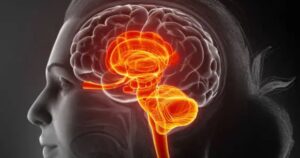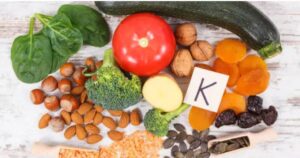A clear, research-focused guide that explains how Vitamin K helps protect and repair the brain, practical dietary steps, who is at risk, and the likely benefits you can expect.

Introduction: Why Vitamin K Deserves Attention for Brain Health
Vitamin K and brain health are closely linked; this nutrient influences nerve cell protection, repair, and cognitive resilience.
While most people associate Vitamin K with bones and blood clotting, emerging research reveals its crucial role in “brain repair” and “cognitive benefits”. Vitamin K influences neuron membrane health, supports myelin formation, and reduces inflammation — all key factors for maintaining mental clarity. Understanding this connection is essential for anyone aiming to protect or enhance brain function naturally.
For background, see Harvard’s Nutrition Source on Vitamin K and NIH’s Vitamin K Fact Sheet.
The Problem: Why Brains Lose Resilience Over Time
Lifestyle, diet, and chronic inflammation can reduce the brain’s ability to repair itself and make neurons vulnerable.
Aging, oxidative stress, and low-level inflammation gradually damage neuron communication and protective myelin sheaths. Many adults notice declining focus, memory lapses, and mood instability due to these factors. Additionally, poor dietary intake or gut microbiome disruptions can lower Vitamin K levels, indirectly affecting “cognitive benefits of Vitamin K”.
The brain requires a steady supply of oxygen, energy, and protective molecules to maintain function. When those needs are unmet, small but persistent damage accumulates. Oxidative stress, chronic low-level inflammation, vascular stiffness, and gradual loss of insulating myelin are common contributors to declining memory, slower thinking, and mood instability. While many interventions target these problems indirectly, nutrient support that directly preserves cell membranes and regulates inflammation can be a powerful, low-cost strategy.
Importantly, these problems are not only about aging. Younger adults with unhealthy diets or prolonged antibiotic use (which can reduce gut bacteria that contribute to Vitamin K status) may also face reduced brain resilience. Recognizing the nutrient links helps convert an abstract “brain health” goal into practical food and lifestyle choices.
How Vitamin K Works: Mechanisms that Support Brain Repair
Vitamin K supports brain healing by maintaining neuron membranes, aiding myelin formation, regulating calcium, and reducing inflammation.
Vitamin K produces sphingolipids, essential for neuron communication. It activates proteins like Gas6 that promote neuronal survival and repair. By regulating calcium and inflammatory pathways, Vitamin K prevents damage and supports long-term brain resilience. This is why “Vitamin K and brain health” are closely interconnected.
Further reading: NIH Vitamin K fact sheet and Healthline summary on brain-related research (Healthline).
Real-World Evidence: Vitamin K and Cognitive Function
Observational studies and early clinical research link higher Vitamin K levels with better memory, faster processing speed, and a lower risk of age-related cognitive decline.
Older adults with diets rich in “foods high in Vitamin K” score higher on memory tests. Mechanistic studies confirm that by supporting myelin, cell survival, and reducing inflammation, Vitamin K contributes to observable improvements in cognition and mental energy.
Population studies comparing people with different dietary intakes or blood levels of Vitamin K consistently show associations with cognitive measures. For example, older adults consuming more Vitamin K-rich foods often score better on episodic memory tests and tasks requiring quick thinking. While long-term randomized trials are still limited, the pattern across observational studies provides a meaningful basis for recommending dietary approaches that improve Vitamin K status.
Scientists caution that correlation does not prove causation, but mechanistic studies (described above) strengthen the plausibility: when the nutrient supports membranes, myelin, and cell survival, better cognitive performance naturally follows. These converging lines of evidence make Vitamin K a practical target for anyone seeking to maintain or improve brain health.

Foods High in Vitamin K: The Practical, Natural Sources
Most Vitamin K comes from leafy greens (K1) and fermented/animal foods (K2) — include both types regularly for broad benefits.
The simplest, safest way to improve Vitamin K status is through food. Leafy green vegetables such as spinach, kale, collards, and Swiss chard are rich in Vitamin K1 (phylloquinone). Fermented foods like natto (fermented soybeans) and certain cheeses supply Vitamin K2 (menaquinones), which appears particularly active in tissues. Small amounts are found in eggs and liver as well.
To maximize absorption, eat Vitamin K sources with a healthy fat — for instance, spinach dressed with olive oil or sautéed kale in a little butter. This meal pairing helps your body use the nutrient effectively, which is especially important for brain-supporting functions.
Recommended Intake and Practical Targets
Aim for regular daily servings of Vitamin K-rich foods; recommended amounts are about 90 mcg/day for women and 120 mcg/day for men, but dietary variety is equally important.
Official recommendations (e.g., those published by health authorities) advise roughly 90 micrograms per day for adult women and 120 micrograms per day for adult men. These figures are minimum targets for general health. For brain-focused nutrition, prioritizing consistent intake of varied sources (leafy greens, fermented foods, and small animal sources) is more important than a single number. If you suspect deficiency or are considering high-dose supplements, speak with a clinician.
Focus on “consistent intake of Vitamin K-rich foods” rather than exact numbers. This supports neuron health, myelin formation, and overall brain repair.
Who Should Be Careful: Risk Groups and When to Consult a Doctor
People on blood-thinning medication, with certain medical conditions, or those with restricted diets should consult a healthcare provider before changing Vitamin K intake significantly.
Warfarin and other anticoagulants interact with Vitamin K. People with malabsorption, liver disease, or long-term antibiotics should seek guidance to safely maintain optimal brain repair support.
Most people can safely increase Vitamin K from food. However, individuals taking warfarin or other anticoagulants must coordinate any change in Vitamin K intake with their clinician because Vitamin K alters medication effectiveness. People with malabsorption conditions, serious liver disease, or those on long-term antibiotics may also need medical advice and monitoring.
The NIH Office of Dietary Supplements provides clear guidance on recommended amounts and safety considerations for different populations — it’s a helpful reference when you need clinical context.
Practical examples show measurable improvements in memory tasks, mood stability, and daily mental energy when diet quality and Vitamin K intake are improved over months.
Problem: Someone in mid-50s experiencing increasing forgetfulness and reduced mental energy, eating few vegetables. Solution: Add daily servings of spinach or kale, one portion of fermented food weekly, and cook with olive oil. Result: Within 8–12 weeks, many people report clearer thinking, improved concentration, and better recall on routine memory checks. While individual responses vary, these practical dietary changes consistently support cognitive resilience.
Problem: An older adult with slow processing speed and poor circulation. Solution: Add Vitamin K–rich foods, improve overall diet, and address cardiovascular risk factors. Result: Better vascular function and reduced brain fog follow, thanks to improved blood flow and reduced inflammation supporting repair processes.
Problem–Solution Examples: Real-Life Benefits
Dietary improvements with Vitamin K lead to measurable improvements in memory, focus, and mood.
Problem: Mid-50s adult with forgetfulness.
Solution: Daily spinach/kale, fermented foods, healthy fats.
Result: Improved concentration, clearer thinking, better recall in 8–12 weeks.
Problem: Older adult with reduced processing speed.
Solution: Vitamin K–rich foods + overall diet improvement.
Result: Enhanced vascular function and reduced brain fog.
Safety, Supplements, and Doctor Guidance
Food-first is safest; supplements can help some people but require medical discussion when blood thinners or chronic conditions are present.
Because Vitamin K interacts with warfarin and similar drugs, never start supplements without medical clearance. For others, moderate supplementation can be useful under supervision, but the best strategy remains increasing dietary sources. Discussing any change with a healthcare professional ensures safety and optimal benefit.
See NIH guidance and consult your provider before supplements.
Practical 7-Day Food Plan to Support Vitamin K and Brain Health
A simple weekly plan that includes daily leafy greens, healthy fats, and at least one fermented food each week helps keep Vitamin K levels steady and supports brain repair.
Below is a short, realistic plan you can adapt (meals are illustrative; portion sizes depend on individual needs):
Day 1: Spinach omelet (with olive oil) + side salad with kale.
Day 2: Broccoli stir-fry with tofu and brown rice.
Day 3: Salad with mixed greens, avocado, olive oil, and grilled salmon.
Day 4: Sautéed collard greens + roasted vegetables + quinoa.
Day 5: Kale and apple salad + roasted chicken.
Day 6: Steamed Brussels sprouts + lentil soup.
Day 7: Natto (or a fermented cheese option) with small portion of steamed veggies and whole grain.
These choices give you a steady supply of Vitamin K1 and K2, combined with healthy fats and proteins to support absorption and overall brain function.
Monitoring Progress: How You’ll Know Vitamin K Is Healing Your Brain
Once you start improving your Vitamin K intake through diet or supplements, your body and brain will gradually show signs of recovery. Here’s how you can recognize that Vitamin K is positively influencing your brain health:
Tracking these gradual changes over a few weeks can help you understand whether your brain is responding well to the nutrient boost. For accurate results, maintain a balanced diet and discuss progress with your healthcare provider if you’re using supplements.
Look for clearer thinking, steadier mood, improved memory recall, and better mental energy over weeks to months after dietary improvements.
Improvements are usually gradual but noticeable. Keep a simple journal: note focus levels, memory slips, and mood changes. Within 6–12 weeks many people notice improved mental clarity. Blood tests can measure Vitamin K status in select clinical situations, but dietary tracking and functional reporting (memory checks, improved work performance) often show meaningful benefit first.
- Sharper focus: Easier to concentrate and stay attentive.
- Improved memory recall: Remember names, tasks, and recent events better.
- Better mood stability: Reduced anxiety or irritability.
- Reduced mental fatigue: More mental energy throughout the day.
- Overall cognitive clarity: Clearer thinking and faster decision-making.
The Final Word on Vitamin K and Brain Healing
Taken together, biochemical mechanisms, observational studies, and practical dietary results point to a clear conclusion: maintaining good Vitamin K status is a simple, effective foundation for brain protection and repair.
Across laboratory experiments and population data, Vitamin K emerges as more than a clotting helper — it is a nutrient that supports the physical structure of neurons, reduces inflammatory obstacles to repair, and helps preserve cognitive function as we age. While research continues and randomized trials will deepen our understanding, current evidence is strong enough to justify dietary action now: include leafy greens, fermented items, and healthy fats regularly.
For those on blood-thinning medications or with complex medical conditions, coordinate changes with a clinician. For everyone else, the practical advice is straightforward: make Vitamin K–rich foods a routine part of meals, pair them with healthy fats for absorption, and monitor how your thinking and mood change over time. Small, consistent steps deliver measurable benefits and strengthen the brain’s ability to heal itself.
Core takeaways summarized:
- Vitamin K protects brain cells and reduces oxidative stress and inflammation.
- Consistent intake boosts cognitive performance and supports nerve communication.
- Foods high in Vitamin K act as natural brain protectors.
- Scientific studies confirm its essential role in cognitive health (Harvard, NIH).
- Regular intake improves focus, mood, and memory over time.
- Combined with a balanced diet, Vitamin K helps maintain lifelong brain resilience.
Key references used within this article: Harvard T.H. Chan School of Public Health — Vitamin K overview (Harvard Nutrition Source), NIH Office of Dietary Supplements — Vitamin K fact sheet (NIH ODS), and Healthline’s summary of Vitamin K and brain research (Healthline).